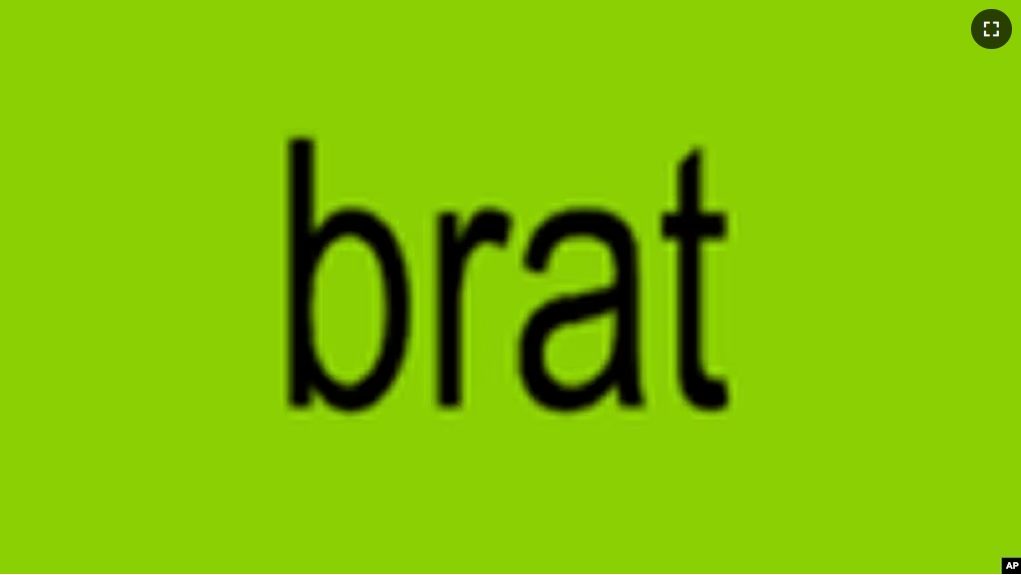From “brat” to “brain rot” and “polarization,” word experts agree that social media and politics have driven conversations that use these terms. Here are their selections for word of the year.
Polarization
The American dictionary publisher Merriam-Webster selected polarization as its word of the year for 2024. The dictionary publisher defines polarization as “division into two sharply distinct opposites; especially, a state in which the opinions, beliefs, or interests of a group or society…become concentrated at opposing extremes.”
As divided as Americans appear, Merriam-Webster says polarization “happens to be one idea that both sides of the political spectrum agree on.”
The word was widely used in news stories and broadcasts to describe the presidential election in the United States. Supporters of both candidates, president-elect Donald Trump and Vice President Kamala Harris, voiced the opinion that the opposing candidate was a threat to the nation.
The U.S. election also brought attention to two other words: pander and weird. Trump’s supporters accused Harris of pandering, in other words, changing her policy positions to get votes. And Democratic vice-presidential candidate Tim Walz called his opponents weird, meaning strange or unusual.

Brain rot
The editors at Britain’s Oxford University Press say usage of its word of the year selection, brain rot, increased by 230 percent from 2023 to 2024.
Oxford defines brain rot as “the supposed deterioration of a person’s mental or intellectual state, especially viewed as the result of overconsumption of material (now particularly online content) considered to be trivial or unchallenging.”
The phrase likely first appeared in written form in Henry David Thoreau’s 1854 book Walden about his experiences living a simple lifestyle. He wrote: “While England endeavors to cure the potato rot, will not any endeavor to cure the brain-rot – which prevails so much more widely and fatally?”
In 2024, the phrase has been used to describe concerns about the harm of overconsuming, or watching and reading too much, online material.
Casper Grathwohl, President of Oxford Languages, noted, “I find it fascinating that the term ‘brain rot’ has been adopted by Gen Z and Gen Alpha, those communities largely responsible for the use and creation of the digital content the term refers to.”
Brat
Politics and social media come together in the Collins Dictionary’s selection of brat as its word of the year.
The most recent usage of brat started as the title of an album by pop singer Charli XCX. Then it went viral as a campaign slogan “Kamala IS Brat” for the Democratic presidential candidate.
The word means different things to different people.
Traditionally, brat describes an immature person or an unruly child. But Collins says it is now used to describe a person with “confident, independent, and hedonistic attitude.”
Collins says the term brat “has clearly captured something of the spirit of the age.” And for a short time, the word brat summer even “established itself as an aesthetic and a way of life.”

Demure
The online Dictionary.com selected demure as its word of the year for 2024. Between January and the end of August, Dictionary.com said the word “saw a nearly 1200 percent increase in usage in digital web media alone.”
The sharp rise is credited to several videos on TikTok by Jools Lebron. “You see how I do my makeup for work?” she asked. “Very demure, very mindful.”
Demure is another example of how popular word usage changes over time. In the 14th century, demure was used to describe people who avoid bringing attention to themselves. Today, the word is used to describe someone who brings attention to themselves with “refined and sophisticated appearance or behavior.”
And those are the Words of the Year for 2024.
I’m Mario Ritter, Jr.
Hai Do wrote this lesson for VOA Learning English.
__________________________________________________
Words in This Story
selection –n. a choice that is made from several possibilities
distinct –adj. different in an observable way
spectrum –n. a complete set of small differences that can exist within one thing: for example, the spectrum of light or of popular opinion
deterioration –n. the condition of being broken down and becoming worse and less effective
endeavor –v. to try to do something with continuous effort
viral –adj. (social media) something that is seen many times and is considered popular
slogan –n. an easily remembered phrase that is meant to build support for something or someone
hedonistic –adj. interested only in pleasure
attitude –n. a way of acting that shows the way one thinks
sophisticated –adj. knowledgeable in worldly matters; complex is a way that appeals to people with a certain kind of knowledge
